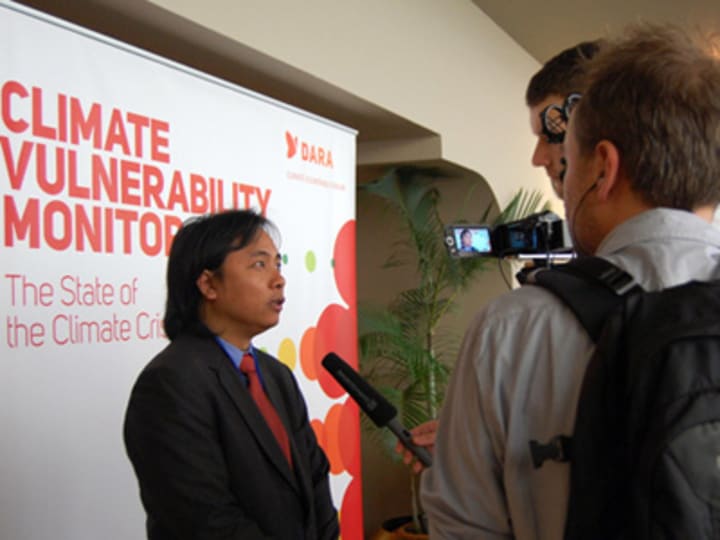
EDITOR’S NOTE: At the U.N. Climate Change Conference in Warsaw, the Philippine negotiator implored for emergency measures to deal with global warming after the recent typhoon in his home country. Overseas Development Institute climate expert Robert Mitchell expresses solidarity, but doubts there is enough evidence to claim the disaster was climate-related.
With the full picture of devastation only now unfolding in the Philippine provinces of Leyte and Samar, the sheer scale of the relief and recovery effort is becoming evident. The typhoon disaster may well turn out to be the most expensive in the history of the Philippines, in terms of both human lives and economic damage. For a country that prides itself on the quality of its disaster risk management, this is a bitter blow and undoubtedly people will ask what went wrong. For the rest of us there is a risk that this may be a sign of things to come unless we wise up to the future threat posed by the relationship between climate change and natural disasters.
Yeb Sano, one of the Philippines climate change negotiators, could be excused for a feeling of déjà vu. Just 12 months ago, following typhoon Botha that battered the Philippines and killed over 1,000 people, Sano gave an emotional speech at the annual UN climate conference. In an address that went viral — at least in U.N. diplomacy terms — Sano called upon his fellow negotiators to agree urgent and ambitious action on climate change, demanding “if not us, then who? If not now, then when? If not here, then where?”
Sano embarks on the next round of UN climate negotiations today in Warsaw with his family’s home town in Leyte laid waste, friends and relatives unaccounted for, and a sense of desperation. He is demanding emergency measures to deal with the threat of climate change, a necessity underscored by science again and again. Just six weeks ago, the Intergovernmental Panel on Climate Change said avoiding more than 2⁰C of warming meant the world needed to stay within a global carbon budget of 1,000 billion tons. We have already spent about 520 billion tons and, at current rates, the budget will be gone by about 2030 and we will together have lost.
Staying within the budget means dramatic decarbonization, with global per-capita emissions reaching less than one tonne in just a few years. In 2010, the US was at 18 tons per capita, the UK 8.5, China 6.3 and India 1.4. Countries close to target include Paraguay at 0.7 tons per capita, Mauritania at 0.9 and pertinently, the Philippines, also at 0.9. For all those countries significantly above, the one-ton threshold would involve:
Almost immediate closure of all coal-fired power stations.
Cessation of all oil exploration.
A massive global energy-efficiency drive.
Switching all fossil fuel subsides to renewable energy.
Major financial payments to poor countries to keep their coal and oil deposits in the ground and their forests standing.
Significant short-term support to people unable to afford energy bills.
Even if all this happened tomorrow, the need to adapt to the impacts of climate change does not disappear. The lag in the climate means that we are already locked in to further warming and more extreme extremes, at least for the next 30 years because of historic emissions. Even warming of 1.9⁰C will be utterly devastating for many, remembering that this is an average increase globally and will mask surface warming of 4⁰C or more for some. Emergency action will therefore also mean global investment and national foregrounding of adaptation actions, including reducing disaster risk, supporting migrants, upgrading scientific analysis of climate risks and protecting ecosystem health.
In calling for emergency action, Sano faces all manner of barriers, not least continued economic uncertainty, major vested interests and persistent blockers like Russia, Saudi Arabia or Poland. He is also working from a platform of legitimacy supported by the assumption that the massive damage of typhoon Haiyan is directly linked to the greenhouse gas emissions of historic polluters and, by extension, others are responsible for the scale of impact. He may indeed be right, but this is difficult to prove from a scientific perspective. He cannot yet prove that typhoon Haiyan was fueled by human-created climate change and this amplified the damage, as science has tended to be quite uncertain on how emissions alter tropical cyclone intensity and frequency. Certainly Haiyan’s wind speeds were high, the sea surface was warm, and it arrived after the traditional typhoon season closed, but none of this immediately screams a climate-change-driven disaster.
As an already disaster-prone country, the Philippines has had an important calculation to make — what wind speeds or flood height does it design its critical infrastructure to withstand? Of course the more robust the design, the more expensive these investments are. The Philippines has certainly taken this issue seriously based on long experience and good data about the risks, but let’s say Southern Leyte’s schools have been designed to withstand winds of 200 km/h, but climate change means the average wind speeds of future typhoons is now 250 km/h and massive damage results whenever they strike. This may well be the scenario. Therefore the Philippines needs to model future climate risks and upgrade its schools accordingly, and needs to provide financial resources to those suffering losses and damages when the design limits are exceeded. It also needs to understand how future emissions change this calculation. All this is rather tough, especially at a time when the country is burying its dead. But I’m sure Sano will say that any such uncertainties should be swept aside and the burden of proof of climate-change damage should not fall on those left with nothing.
Edited for style and republished with permission from the Overseas Development Institute. Read the original article.
